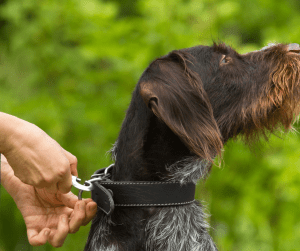When Should Dogs Be On The Lead?
Most dogs need to spend time running off lead in safe places as this is essential for their physical well being, as well as their psychological happiness. However, there are times when keeping your dog on the lead is the responsible thing to do. If you wonder when should dogs be off lead, read our Holidays4Dogs article on for further information.
What the law says.
Law in the UK states that all dogs must be on a lead on a designated road. In addition they must also be on lead in certain public areas, as laid out by individual local councils.
When there are a lot of people around in public spaces, it is only fair to remember that not all people, or dogs for that matter, are happy to approached be by off lead dogs. See our other Holidays4Dogs article about ‘Yellow Dogs – Dogs in Need of Space’.
Bear in mind, the Dangerous Dogs act requires dog owners to ensure their pets are not ‘dangerously out of control in a public place’. Remember, your dog does not have to be aggressive, or bite.
However, if someone feels threatened by your dog, they could report you. The Act refers to any breed, not just pit-bull types.
If your dog has a great recall and will come back to you every time you call him, no matter what the distraction, then this is ideal.
If you are in any doubt, it is better to put your dog on the lead before he has a chance to cause a nuisance to other people, or other dogs. Naturally, dogs should always be on the lead around livestock, horses, or wildlife.
Our carers will allow your dog off-lead once they have got to know your dog. However, this is only allowed with the owner’s written consent, which can be found on our booking forms. While our carers will happily walk guest dogs off-lead, they will always err on the side of caution, ensuring the safety of your dog and responsibility to other members of the public.
Dog friendly zones.
 Earlier this year in Belfast, the city council began to consider rules about when, and where, dogs should be allowed off lead. It was suggested dog owners would only be allowed to walk their dogs during specific time zones.
Earlier this year in Belfast, the city council began to consider rules about when, and where, dogs should be allowed off lead. It was suggested dog owners would only be allowed to walk their dogs during specific time zones.
Another suggestion was to have dedicated areas of enclosed land so dog walkers could allow their dogs to run free – similar to American dog parks.
However, these places are controversial and many dog trainers and behaviourists, both here and abroad, have their reservations.
This is because dedicated dog parks often have a high number of off lead dogs mixing – some of them with poor social skills and little training. With this, brings an increased chance of conflict and dog fights.
Local bye-laws.
Portsmouth operates dog control orders which stipulate where and when dogs can be off lead. Owners will be committing an offence if they do not comply. They also have a ‘Dogs on Leads by Direction’ policy. This means dogs can be exercised off lead unless a council officer, or park ranger, requests dogs are put on a lead. This may be because a park is particularly busy, or because the dog is considered to be causing a nuisance.
There are many councils across the UK who have now put similar bye-laws in place. If you are visiting different parts of the country with your dog, familiarise yourself with the local rules, because they do vary quite considerably.
It goes without saying that dogs should never be off lead where there are livestock roaming. Even the most well behaved and obedient pet can be unpredictable around livestock, particularly sheep and lambs.
How about puppies?
For an adult dog, you need to be sure that your dog is well behaved off-lead and has a good recall. With puppies, the rule of thumb isn’t that much different. However, puppies need to learn recall skills, for which you may need patience.
It is imperative puppies learn to come back to you while in safe surroundings. Don’t let your puppy off the lead where are there too many distractions, or hazards, while training.
When it comes to recall, many puppies become challenging around 6 months old. You can try using a very long line. This way, if he does decide to run away and ignore you, you can step on the end of the line and encourage him back to you.
Whether it is puppies, or adult dogs, they all need to be pretty reliable off lead, not least for their own safety.
Always call your dog back for a treat, or a game, and then let him go again. No matter what his age, keep reinforcing the correct behaviour.
A note about retractable dog leads – There are a few things to consider when using these types of dog lead. You can read more here.
Conclusion.
Always consider the context and location when considering whether to let your dog off the lead. How many people are around? Are there children playing nearby? Is there a busy road?
The bottom line is that the more well-behaved and reliable your dog is, the more freedom you can allow him to have.
If you want to read more about what type of dog leads to buy click here.


